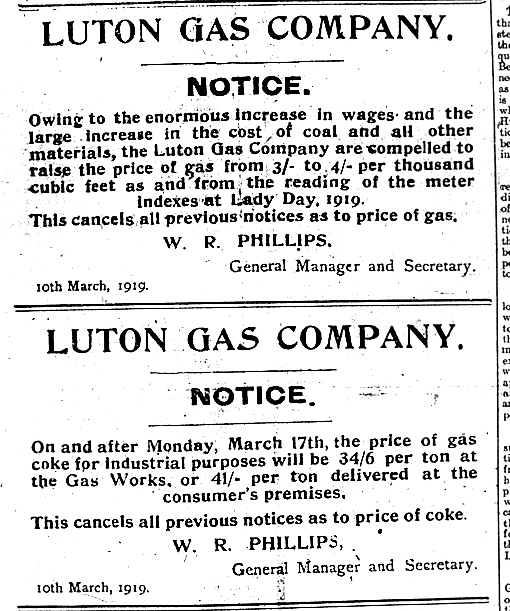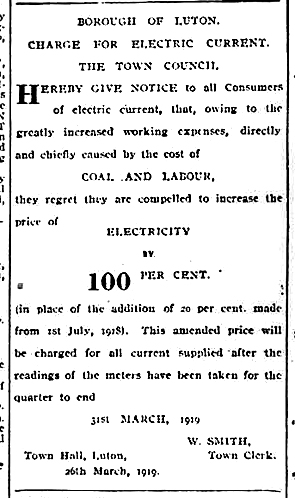Turmoil throughout Europe, wide-spread industrial unrest in Britain and much higher gas and electricity charges for Luton householders, who were also facing a shortage of coal due to miners' strikes. The crippling legacy of war was being felt everywhere.
For Lutonians, the first bad news on their fuel budgets came from the Luton Gas Company. The Beds & Herts Saturday Telegraph (March 8th, 1919) revealed that charges were to rise from three shillings per 1,000 cubic feet to 3s 10d, the lowest possible. The Company had lost over £12,000 during 1918, seeing its balance of £11,718 1s 5d at December 31st, 1917, reduced to a deficit of £981 18s 5d.
 Chairman Mr R. S. Tomson said the increase was distasteful to the directors and circumstances would have justified an increase the previous September, and the increase was having to be backdated to Christmas. Higher pricing had been delayed until the last possible moment, in the hope its necessity might have been avoided. And he denied the Company was profiteering.
Chairman Mr R. S. Tomson said the increase was distasteful to the directors and circumstances would have justified an increase the previous September, and the increase was having to be backdated to Christmas. Higher pricing had been delayed until the last possible moment, in the hope its necessity might have been avoided. And he denied the Company was profiteering.
Mr Tomson said the Gas Company had had to face unexampled difficulties and and unprecedented demands. They had had to meet increased calls from labour – wages had increased from a pre-war total of £15,000 to £28,970 in 1918; and the price of the 60,000 tons of coal used had risen by over £10,000, with further increases anticipated. Difficulties had been compounded by Government control over coke, sulphate of ammonia and residuals generally.
The choice lay between the presented proposal of a backdated 3s 10d per 1,000 cu ft, or an increase of a prospective character of about 4s 4d or 4s 6d.
The directors, said Mr Tomson, hoped to be able to get through without further advances on price, but no one could give pledges in that direction.
But by the time The Luton News appeared the following Thursday an advertisement was carried stating the price of gas would be increased from 3s per 1,000 cu ft to four shillings and the backdating cancelled.
The newspaper reported: “The Directors, in view of public opinion, have decided not to impose an increase of 10d per thousand cubic feet and calculate it “as from the meter readings at Christmas,” but to raise the figure from 3s to 4s, commencing from the Lady Day [March 25th] quarter.”
“Electricity goes up 100 per cent.” that was the shock headline in the Beds & Herts Tuesday Telegraph (March 25th, 1919) following a meeting the previous evening of Luton Town Council. Unlike the gas company, the electricity works were Council run.
 The Electricity Committee had recommended an increase in price of 75 per cent, to be reviewed after six months. The figures submitted, however, showed that the proposed increase would not cover the present conditions of working, and that the figure should be at least 90 per cent, if the undertaking was to pay its way.
The Electricity Committee had recommended an increase in price of 75 per cent, to be reviewed after six months. The figures submitted, however, showed that the proposed increase would not cover the present conditions of working, and that the figure should be at least 90 per cent, if the undertaking was to pay its way.
The 100 per cent increase was agreed after three-and-a-half hours of debate on the Monday night, with the Press and public excluded.
From the same Town Council meeting and in the same edition of the Beds & Herts Tuesday Telegraph, came the headline, “Coal famine in Luton. Corporation's emergency stock to be distributed.”
Said the report: “Luton, which has a domestic consumption of almost a thousand tons a week, is faced with a very serious shortage – so serious that the Town Council have obtained the Coal Controller's permission to draw on the emergency supply which they have held in stock for the last two years, and to issue it in small quantities to relieve the present crisis.
“How serious the present position is may be gathered from the fact that the stock in the hands of merchants, which usually stands at well over a thousand tons, has been falling gradually since the beginning of February, and last weekend was down to 208 tons.
“Coal which was on its way to Luton as late as Saturday was diverted to other destinations, merchants' trucks have been diverted, and there are strike troubles in the coalfields from which the domestic coal supply of the borough is drawn.”
At a special meeting of the Coal Committee held ahead of the Council meeting, Deputy Mayor (Councillor Charles Dillingham) gave the following figures of coal in stock at various weekend: February 15th, 1,012 tons; February 22nd, 872 tons; March 1st, 625 tons; March 8th, 505 tons; March 15th, 212 tons; March 22nd, 208 tons.
As the winter was nearly over and many poor people were without firing, said Councillor Dillingham, it would be better to release the emergency supply now than to hold it over to the summer, when so much firing would not be needed. He moved that the Council approve of the coal being released for distribution in a manner which would give the greatest benefit to the public.
Councillor C. Yarrow said the coal had been in stock for two winters and now there was a real shortage of fuel. There was a prevalence of bronchitis in the town, and many people were suffering from this shortage of fuel.
The Town Clerk, detailing the conditions under which the stock of coal was obtained, said it was stated originally that it was wanted for re-sale in quantities not exceeding 5 cwt, the sole object being to prevent any distress arising in case customers were unable to obtain coal through the usual channels. It was for people who could not purchase large quantities or could not store it.
The Coal Controller, as a tentative measure, agreed to 500 tons being stacked for distribution in the event of ordinary supplies failing, and subject to the condition that his consent was obtained before a distribution was made, which consent would only be given on receipt of an intimation from the Council that local coal merchants were no longer able to cope with demands. That consent was given on Saturday.
Alderman Oakley moved, and Councillor Bone seconded, that the coal should be distributed in quantities not exceeding 2 cwt to any one customer. The resolution was agreed.

